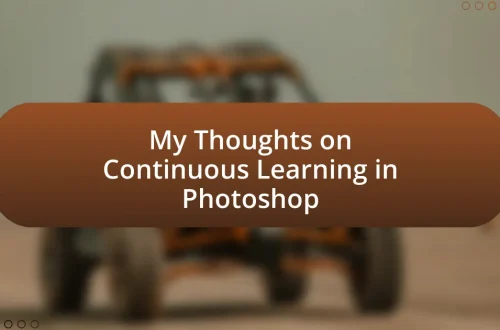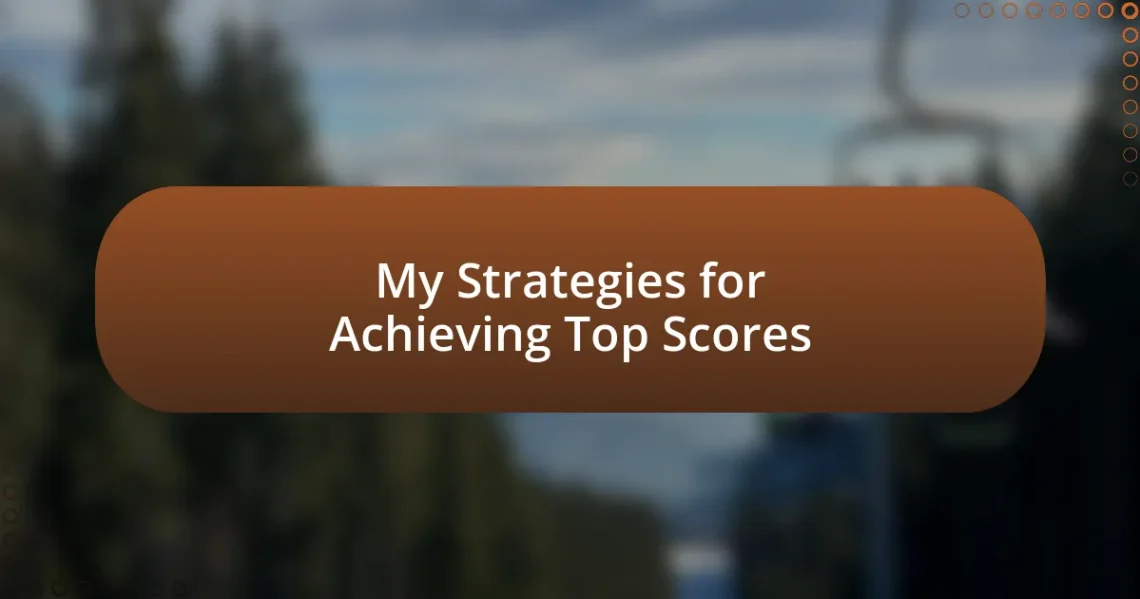
My Strategies for Achieving Top Scores
Key takeaways:
- Understanding your unique learning style enhances study effectiveness; visual, auditory, and hands-on techniques can improve retention and enjoyment.
- Setting realistic goals by breaking them into smaller, manageable tasks helps maintain motivation and reduces overwhelm.
- Incorporating effective study techniques like active learning and the Pomodoro Technique optimizes retention and concentration.
- Regularly reviewing performance and employing reflective practices, such as journaling, leads to valuable insights for future improvements.

Understanding Your Learning Style
Understanding your learning style is essential for maximizing your study effectiveness. I remember struggling with complex topics in school until I realized I was a visual learner. By incorporating diagrams and colorful notes, information suddenly clicked for me, transforming my study sessions into more enjoyable and productive experiences.
Have you ever felt overwhelmed by traditional lecture-based learning? I certainly have. Experimenting with different methods—like listening to podcasts or using flashcards—helped me identify that I retain information best through auditory and hands-on techniques. Discovering this about myself not only boosted my confidence but also made studying feel less like a chore.
Take a moment to reflect: what methods resonate with you? For me, combining various learning styles brought clarity. I began to see connections between subjects, reinforcing my understanding. It’s fascinating how recognizing one’s unique learning style can foster a more personalized approach to mastering new concepts.
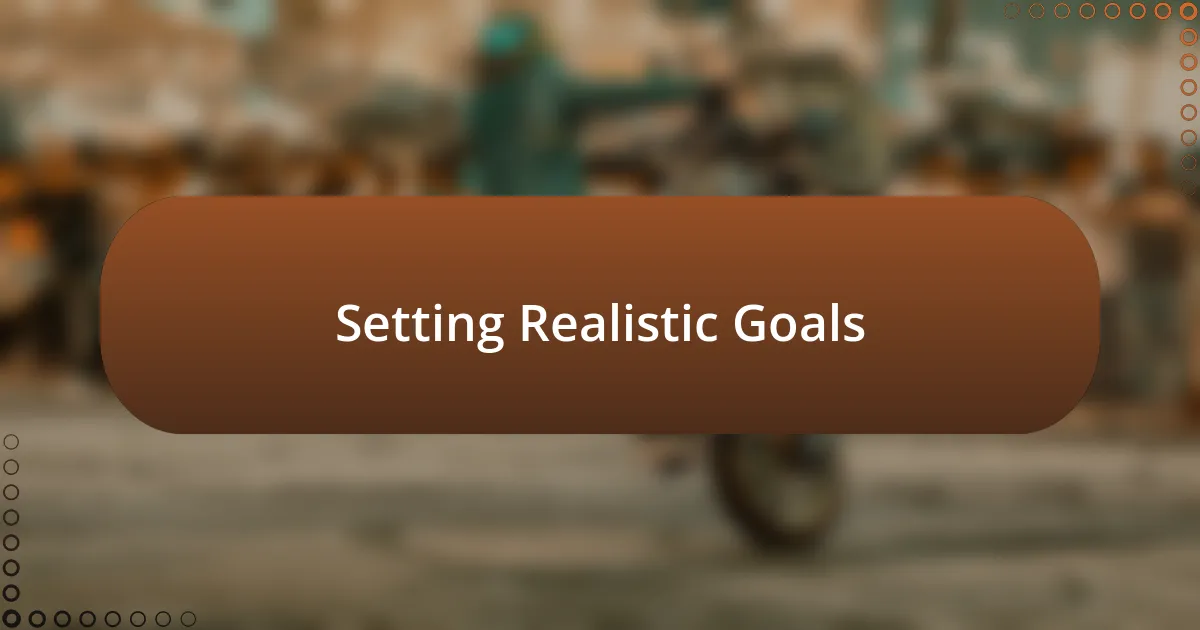
Setting Realistic Goals
Setting Realistic Goals
When I started setting goals, I often aimed too high and ended up feeling disappointed. It took time to recognize the importance of pacing myself. Now, I focus on smaller, achievable milestones that keep my motivation alive and drive my progress forward. Here are some strategies I’ve found effective:
- Break larger goals into smaller, manageable tasks.
- Set specific deadlines to create a sense of urgency.
- Regularly assess my progress to adjust goals as needed.
I vividly remember one semester when I decided to aim for straight A’s. It sounded great, but I quickly felt overwhelmed. Instead, I learned to target specific subjects where I needed improvement. That shift not only reduced my anxiety but also allowed me to celebrate small victories along the way, making my educational journey far more enjoyable.
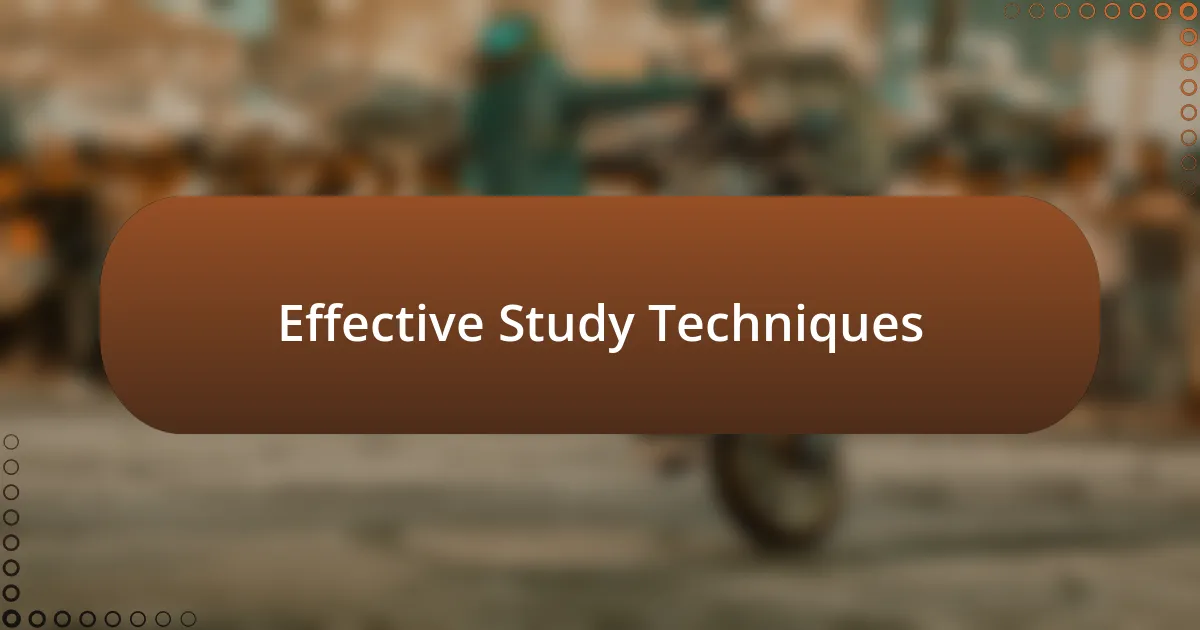
Effective Study Techniques
Effective Study Techniques
Finding study techniques that resonate with my learning style has been a game-changer. For instance, I’ve discovered that active learning—such as summarizing concepts in my own words—helps me retain information much better than passively reading textbooks. Engaging with the material, rather than just absorbing it, makes the process feel less like a chore and more like a conversation with the subject matter.
Another approach that I’ve implemented is the Pomodoro Technique. This involves studying in focused bursts, typically 25 minutes, followed by a 5-minute break. It might sound simple, but the impact on my concentration and productivity has been significant. I remember feeling fatigued and unfocused during long study sessions, but now, this method keeps my mind fresh and my motivation high.
I also emphasize the importance of creating a conducive study environment. Personally, I’ve found that a tidy, quiet workspace free from distractions enhances my focus. It’s quite powerful to see how something as simple as organizing my study area can lead to an improved understanding of complex topics.
| Study Technique | Description |
|---|---|
| Active Learning | Engaging with material through summarization or teaching concepts to others. |
| Pomodoro Technique | Studying in intervals with scheduled breaks to boost focus and retention. |
| Conducive Study Environment | Creating a clean, organized space to minimize distractions and enhance concentration. |
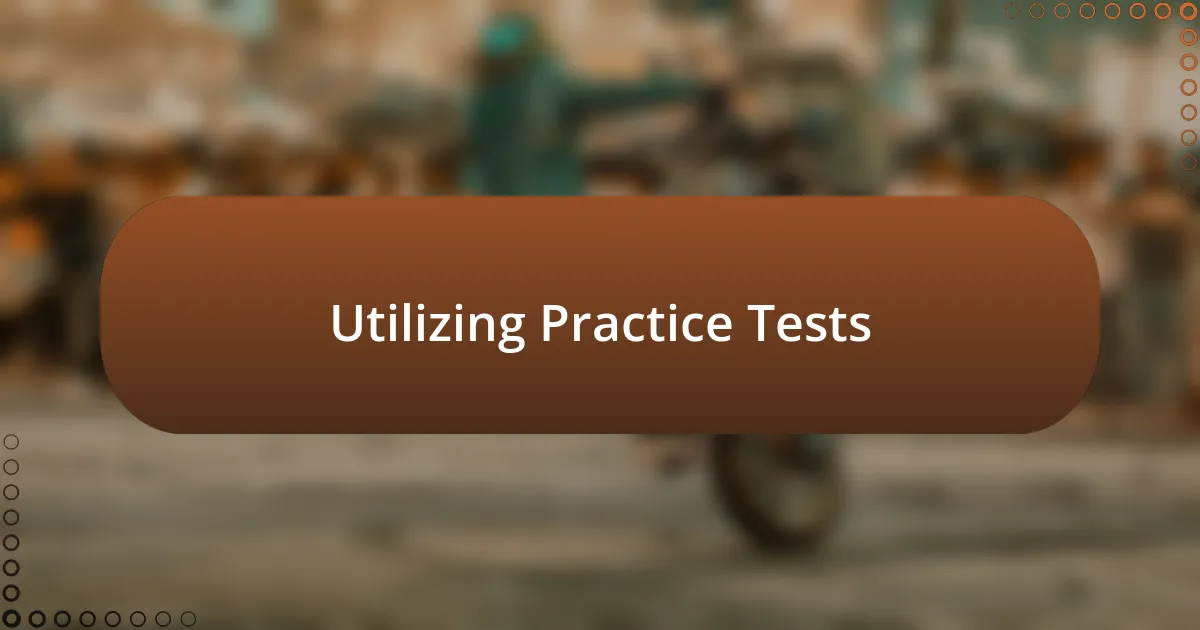
Utilizing Practice Tests
Utilizing practice tests has been a pivotal part of my study routine. I remember the first time I took a practice test for a big exam; my heart raced, and I felt a mix of anxiety and anticipation. However, those initial nerves quickly turned into confidence as I saw the areas I needed to improve. Isn’t it amazing how simulating the actual test environment can reveal gaps in our understanding?
I’ve found that timing myself while taking these practice tests helps mimic the pressure of the real exam. For instance, during one session, I was shocked to discover that I struggled with time management. It was a wake-up call that shed light on how I needed to work on speeding up my responses without sacrificing accuracy. Have you ever noticed that the more you practice under real conditions, the more prepared you feel?
Moreover, reviewing incorrect answers has transformed my learning experience. Each time I analyze mistakes, I’m not just memorizing the right answers; I’m understanding the concepts behind them. It feels gratifying to turn confusion into clarity, ensuring that I won’t make the same errors again. Isn’t it rewarding to see progress made through understanding, rather than just rote memorization?

Managing Time Wisely
Time management is a game changer when it comes to studying effectively. I remember cramming the night before a big exam, feeling overwhelmed and frantic. That chaotic approach led to sleepless nights and stress-induced mistakes. It took a few tough lessons to realize that dividing my study time into smaller, focused blocks made all the difference. Have you ever tried scheduling your study sessions like appointments?
Creating a detailed study schedule has been instrumental in keeping my progress on track. Initially, I found it tricky to stick to a plan, often tempted to procrastinate or overestimate my productivity. But after a while, I began to see the benefits of blocking out specific times for each subject. The satisfaction of ticking off completed tasks felt incredible, and I grew more confident as I noticed how my understanding deepened with consistent effort. Isn’t it motivating to witness your own discipline pay off in tangible progress?
Also, I consider it crucial to factor in breaks while managing my study time. There was a time when I thought powering through hours of study without pause was the best strategy. However, I discovered that taking short breaks revitalized my focus and kept me engaged. I started doing stretches or grabbing a snack, and each time I returned to the books, my energy and concentration improved dramatically. Have you experienced that burst of clarity after stepping away for a moment?
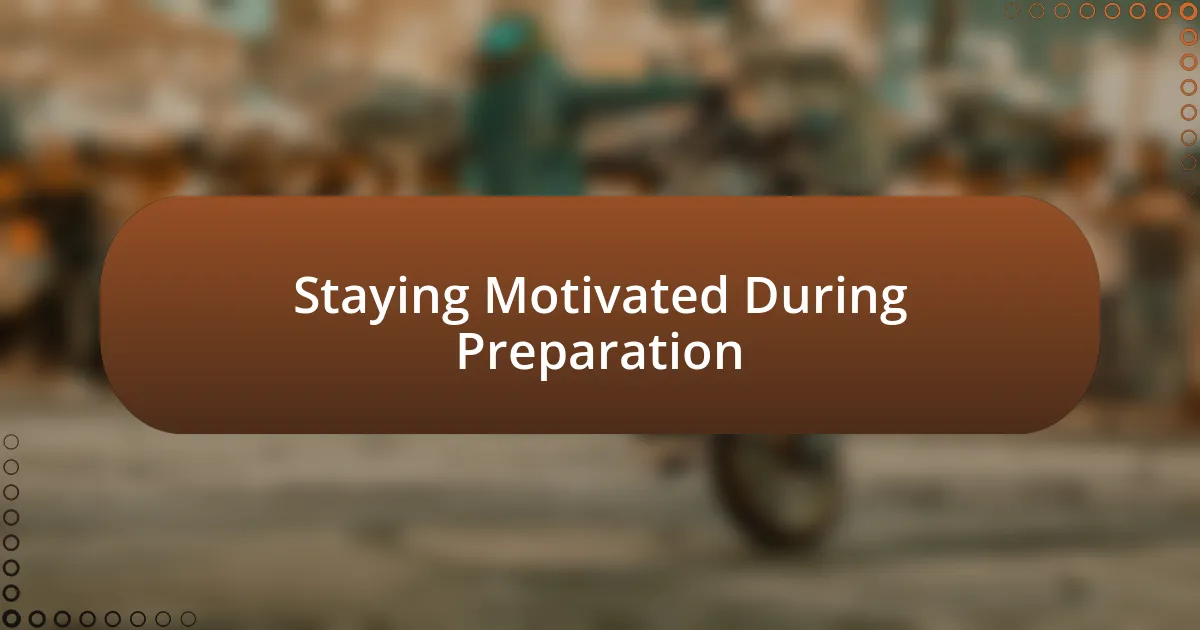
Staying Motivated During Preparation
Staying motivated during preparation is often a delicate balancing act. I’ve learned that setting small, achievable goals can create a sense of accomplishment that fuels my drive. During one particularly intense study period, I crafted a list of mini-tasks for each session, and checking them off brought a rush of motivation. Have you ever felt that thrill when you realize you’re one step closer to your larger goal?
Another approach that has kept my spirits high is surrounding myself with a supportive study group. I vividly recall a few late-night study sessions where we shared tips, quizzed each other, and even indulged in much-needed laughter. These moments of camaraderie made the tough material feel lighter and gave me a renewed sense of determination. Wouldn’t you agree that having people who understand the struggle can make the journey so much more enjoyable?
Moreover, I’ve found that incorporating rewards into my study routine significantly boosts my motivation. For example, after completing a major chapter or mastering a challenging concept, I treat myself to something special, whether it’s a favorite snack or a short episode of a show I love. This practice has created a positive association with my study milestones. Isn’t it amazing how a little reward can turn the grind into something to look forward to?

Reviewing and Analyzing Performance
Reviewing and analyzing performance is a crucial step in my study routine. After each exam, I take the time to reflect on what went well and what didn’t; this not only helps me identify my strengths but also areas for improvement. I remember a particular math test where I mismanaged my time. I spent too long on certain questions, and this wasn’t the first time it happened. Noticing this pattern prompted me to practice time management techniques, shaping a more strategic approach to future tests.
I also keep a learning journal where I document my thoughts post-exam. It’s fascinating how writing things down clarifies my understanding and reinforces lessons. In one entry, I recorded how my nerves impacted my performance in a science mock exam. By recognizing this, I was able to develop stress-reduction techniques, like breathing exercises, which turned out to be invaluable during my actual exams. Have you ever tried journaling your thoughts after a significant performance?
Looking at test results with a critical eye has shown me the importance of dissecting not just the score but the methods used to achieve it. For instance, after analyzing my multiple-choice question responses, I noticed a pattern where I second-guessed myself too often. This insight led me to trust my instincts more during tests. Isn’t it fascinating how a deeper dive into our experiences can dramatically shift our approach?



